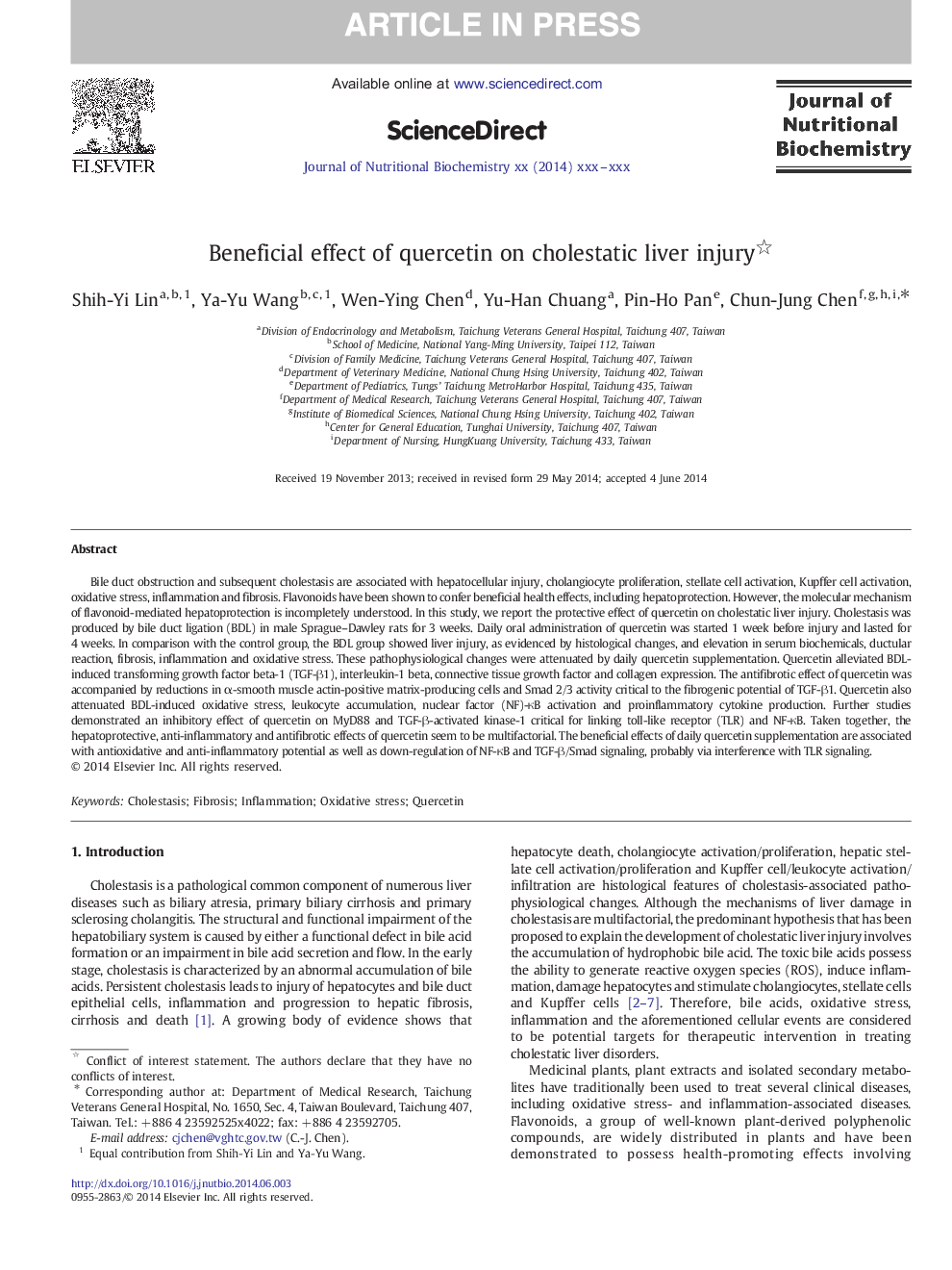| کد مقاله | کد نشریه | سال انتشار | مقاله انگلیسی | نسخه تمام متن |
|---|---|---|---|---|
| 8337070 | 1540655 | 2014 | 13 صفحه PDF | دانلود رایگان |
عنوان انگلیسی مقاله ISI
Beneficial effect of quercetin on cholestatic liver injury
ترجمه فارسی عنوان
اثر مفید کورستین بر آسیب کبد کولاستاتیک
دانلود مقاله + سفارش ترجمه
دانلود مقاله ISI انگلیسی
رایگان برای ایرانیان
کلمات کلیدی
موضوعات مرتبط
علوم زیستی و بیوفناوری
بیوشیمی، ژنتیک و زیست شناسی مولکولی
زیست شیمی
چکیده انگلیسی
Bile duct obstruction and subsequent cholestasis are associated with hepatocellular injury, cholangiocyte proliferation, stellate cell activation, Kupffer cell activation, oxidative stress, inflammation and fibrosis. Flavonoids have been shown to confer beneficial health effects, including hepatoprotection. However, the molecular mechanism of flavonoid-mediated hepatoprotection is incompletely understood. In this study, we report the protective effect of quercetin on cholestatic liver injury. Cholestasis was produced by bile duct ligation (BDL) in male Sprague-Dawley rats for 3 weeks. Daily oral administration of quercetin was started 1 week before injury and lasted for 4 weeks. In comparison with the control group, the BDL group showed liver injury, as evidenced by histological changes, and elevation in serum biochemicals, ductular reaction, fibrosis, inflammation and oxidative stress. These pathophysiological changes were attenuated by daily quercetin supplementation. Quercetin alleviated BDL-induced transforming growth factor beta-1 (TGF-β1), interleukin-1 beta, connective tissue growth factor and collagen expression. The antifibrotic effect of quercetin was accompanied by reductions in α-smooth muscle actin-positive matrix-producing cells and Smad 2/3 activity critical to the fibrogenic potential of TGF-β1. Quercetin also attenuated BDL-induced oxidative stress, leukocyte accumulation, nuclear factor (NF)-κB activation and proinflammatory cytokine production. Further studies demonstrated an inhibitory effect of quercetin on MyD88 and TGF-β-activated kinase-1 critical for linking toll-like receptor (TLR) and NF-κB. Taken together, the hepatoprotective, anti-inflammatory and antifibrotic effects of quercetin seem to be multifactorial. The beneficial effects of daily quercetin supplementation are associated with antioxidative and anti-inflammatory potential as well as down-regulation of NF-κB and TGF-β/Smad signaling, probably via interference with TLR signaling.
ناشر
Database: Elsevier - ScienceDirect (ساینس دایرکت)
Journal: The Journal of Nutritional Biochemistry - Volume 25, Issue 11, November 2014, Pages 1183-1195
Journal: The Journal of Nutritional Biochemistry - Volume 25, Issue 11, November 2014, Pages 1183-1195
نویسندگان
Shih-Yi Lin, Ya-Yu Wang, Wen-Ying Chen, Yu-Han Chuang, Pin-Ho Pan, Chun-Jung Chen,
